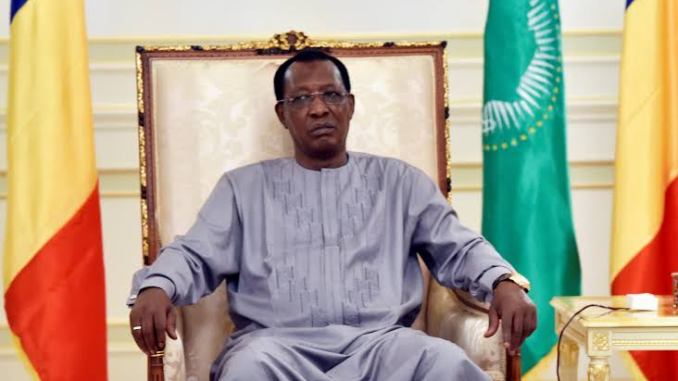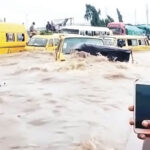There is no doubt that late Idriss Deby was a colossus when considered within his geo-strategic influence on the Sahelian security firmament, the Lake Chad Basin and even the greater sub-Saharan region down to the Central Africa Republic. Aside from being a charismatic former rebel leader and having held power in Chad for about 20 years, Deby was a close ally of France, the US and even the emerging China. He was commander-in-chief of the most battle-tested army in the West African sub-region because Chad had been in all sorts of wars and strife with rebels since he took power.
Deby was also able to bring his influence to bear on the diplomatic and military effort against the Islamist threat in the Lake Chad Basin, by being the go-to man by his counterpart heads of states and foreign governments on critical negotiations for the release of abductees. The Chadian government under him played important roles in the release of the batches of Chibok girls. His closeness to the French government provided for the establishment of the Force Barkhane Headquarters in Ndjamena, though we have not seen the intervention of France in the incursion by FACT, which resulted in his death. The world, however, saw the presence of President Macron at his funeral.
His death would affect Nigeria – as it is given that the attention of Chad under the interim military government will be lifted to the northern front, where the greatest threat to the regime security has emanated with dire consequence in the assassination of Idriss Deby.
The growing political tension of citizens and opposition leader objecting to the military interim government will also take up much of the energy of the government, led by the young son of the late president. His son, being the interim president will naturally feel committed to avenge his father’s death and also prove to the nation and the global community that with the loss of his strong father and ruler, the Chadian nation and its armed forces remain strong and relevant to the security of the nation.
This situation will leave Nigeria with a huge quantum of less support in the MNJTF coalition, where Chad was always available to complement Nigeria’s shortfall of men and material to clear, occupy and dominate the Lake Chad basin, which after the Sambisa of Abubakar Shekau, is the stronghold of the ISWAP.
Nigeria must therefore appreciate that it has much less than an ally in Chad to deal with the threats from the Lake Chad basin, as much as its proximity of the Chadian side to N’djamena.
What more, the strategic interest of Boko Haram is Nigeria. N’djamena is the closest capital of the Lake Chad Basin Commission states, but the Islamist terrorist have never shown intention of attacking it. They were well settled to exploiting the resources of the basin to fund their war economy and fulfill in part their ambition of holding and ruling over a territory.
Nigeria will need to raise its military capability to fill the gap created, as well as its diplomatic ability to build multi-lateral and bi-lateral coalitions to fill and secure the vacuum, which the Chadian armed forces under Deby’s awesome personality had provided.
I personally do not agree with the stories going around that the government will be posting the immediate past Service chiefs to the neighbouring nations as ambassadors. Nigeria needs strong and professionally experienced career diplomats to occupy these posts. If we also must send the best diplomats, the ambassadors should be very meritorious officers of the NIA who really understand intelligence from an international relations position and not former military officers. The defence sections of those states can complement the diplomats from the military strategy side of affairs. The former Service chiefs, if they have to be diplomatic in consonance to our war efforts, should be posted to nations from where we purchase military hardware, as well as train our personnel. I believe that they will better fit in those nations like China, India, Pakistan, Belarus, Russia, Ukraine and even Sudan and South Africa.
I am glad that President Buhari has understood the importance of building an international coalition to deal with our security challenges. This is because in the war against internationalised threats requires a multilateral approach. We never can go it alone. Nigeria should have since accepted the location of AFRICOM in Nigeria, but we allowed that privilege to elude us because of national pride. I doubt the US will accept to bring it from Germany to Africa and if they do, it will not be in Nigeria. The interest of the US is in the Indian Ocean where her competition with China is clearer. US defence priority in Africa is no more than in the Gulf of Guinea and the hydrocarbon resources it is aiming to protect. Nigeria must also count itself as part of the Sahel community because even the evolving force of geography through desertification has made us so. We may still get a little US interest because of the threats in the Sahel, but Niger and Mali have already given them more welcome than we have. Again, all the security threats in the main Sahel, are here with us. So, we also must reach out to France to be part of the G5 Sahel, involving Mauritania, Mali, Burkina Faso and Chad. We must find a way to benefit from the 4,000 strong French Force Barkhane, in the Sahel, so that our own military and resources will be complemented.
On the increasingly parlous state of Nigerian security and what needs to be done, we have to understand that first, we have a serious criminal armed violent threat to Nigeria, promoted and exacerbated by general mistrust and apathy towards the ruling class. So, there is the need to first arrest the violence. But this has to be done concurrently with political efforts to douse the tension of divisive politics, distrust and criminal violence with political undertones that permeates our polity. There are no immediate solutions, but clear good intentions must be operationalised by the political, traditional and the intelligentsia across the nation to accept that Nigeria needs unity, as well as unity of efforts to deal with the serious security challenges we have in our hands.
Our defence and security forces need a lot of support and trust from the public. We must love and help them by believing in their noble purpose. No one can do their job, but them. That is why they are professionals. No doubt there are problems within the system, but they can be addressed with steady but consistent and sustainable reforms, that are well budgeted for, oversighted and sanctioned, where there are infractions. Politicians and social groups must tone down the language of division, hate and all the acrid vitriol that has become the currency and settle of communication in Nigeria today. We must find patriotism and love for our nation. The sources of our problems are in our divisions, while the solution lies in the consolidation of the strength of our diversity. We must douse hateful rhetoric, fake news and propaganda. No military or law enforcement approach, even in the most sophisticated of societies resolves political difference, especially of the violent sectarian kind, consistently fed by ancient suspicion and mistrust.
Brig Gen Saleh Bala (Rtd), President of White Ink Institute for Strategy Education and Research (WISER), wrote from Abuja

 Join Daily Trust WhatsApp Community For Quick Access To News and Happenings Around You.
Join Daily Trust WhatsApp Community For Quick Access To News and Happenings Around You.


